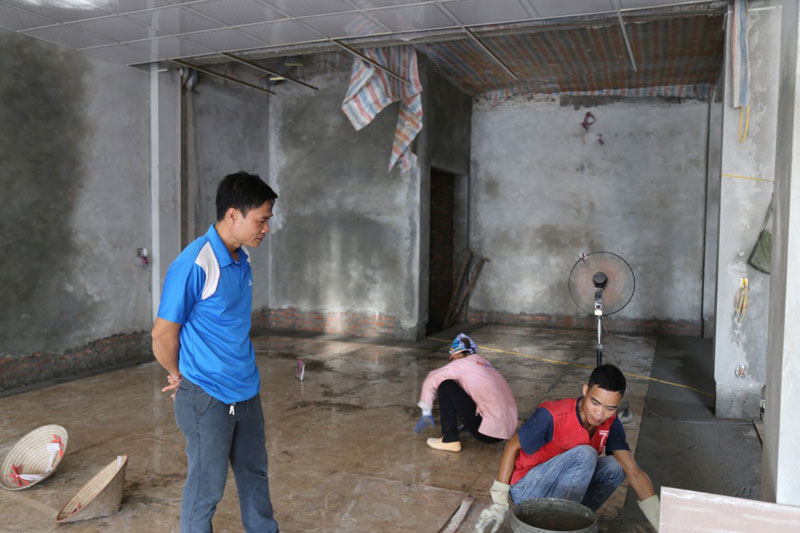
(HBO) - Coming from a purely agricultural family with many economic difficulties, but with determination and effort, Mr. Dinh Quoc Hong, living in Group 15, Tan Hoa ward (Hoa Binh city) has become one of the typical households in the labor emulation movement of hunger eradication and poverty reduction.
In addition to raising fish, taking advantage
of the water surface, Mr. Hong’s family invested in raising ducks, pigs to
increase the income. Currently, on average each year, Mr. Hong's family
collected the income of 150 million VND from the fishponds and livestock after
deducting expenses and creating jobs for 5 local workers.
![]()

Mr. Dinh Quoc Hong regularly directs and
guides the workers on the construction site.
In recent years, realizing that the area of
agricultural land has become narrower, the agricultural production has been
more difficult, especially due to environmental pollutions, his family’s fish
ponds are affected, the output for commercial fish is not favorable, Mr. Hong
thinks of changing the industry to keep up with the current trend. He recalled
his previous time of working as a construction worker, accumulating experience
and capital, in 2015, Mr. Hong decided to buy construction machines and set up
a Construction Team to receive civil works serving people in the locality. Mr
Hong said: My construction team is mostly local agricultural laborers. When I
founded, I had to learn a lot about management and machinery. Besides, I also
looked for skilled workers to work as masters and to train other members in the
group.
Up to now, through two years of maintenance,
with the motto of high prestige, the construction team has maintained the job
for nearly 20 members, the average income of a person per year is above 60
million VND. Through the operation, the prestige of the Construction Team has
been raised, from the small civil works to ensure quality and be on schedule,
Mr. Hong’s team has received many large projects such as constructions of
office buildings, restaurants, medium-sized supermarkets, so the average annual
income of team members has increased. From an initial construction team, he has
formed four more construction teams with more than 40 members and developed to
the surrounding districts, such as Cao Phong, Da Bac, Kim Boi, etc. At the peak,
his team has 60 - 70 employees working regularly, the average income is 5
million VND per person per month.
More than just an information technology teacher, Bui Van Nien is an inspiring figure who has nurtured the scientific curiosity and creative spirit of students in Vietnam’s ethnic minority communities.
Da Bac is the most disadvantaged mountainous district in Hoa Binh province, with ethnic minorities accounting for about 90% of its population. Over the past years, the district has mobilised resources to implement ethnic policies to improve the quality of life of local people.
In recent years, Hoa Binh province has consistently prioritised the protection, care, and education of children, particularly those from ethnic minorities and disadvantaged backgrounds, by creating a safe, healthy, and nurturing environment for their all-round development.
The Steering Committee for Tobacco Harm Prevention and Control of Hoa Binh province, in coordination with the Tobacco Harm Prevention and Control Fund, held a ceremony on May 28 in response to the World No Tobacco Day (May 31) and the National No Tobacco Week (from May 25 to 31). The event was chaired by Nguyen Van Toan, Standing Vice Chairman of the provincial People’s Committee and head of the Steering Committee.
Since 2021, the Center for Industrial Promotion and Industrial Development Consulting (CIIDC) under the Department of Industry and Trade has been implementing a school lighting model as part of the plan for using energy efficiently and economically in Hoa Binh Province in the pẻiod of 2021 - 2025. This model not only aims to improve the learning conditions and enhance the education quality, but it also promotes the message of energy saving, energy security, environmental protection and contributes to the goals of socio-economic development.
In the 2024 - 2025 school year, the entire Hoa Binh provincial education sector includes 520 educational institutions and schools. Among them are 13 ethnic boarding schools with 153 classes and 4,487 students. Four of these schools have met national standards, reaching 30.7 percent.



